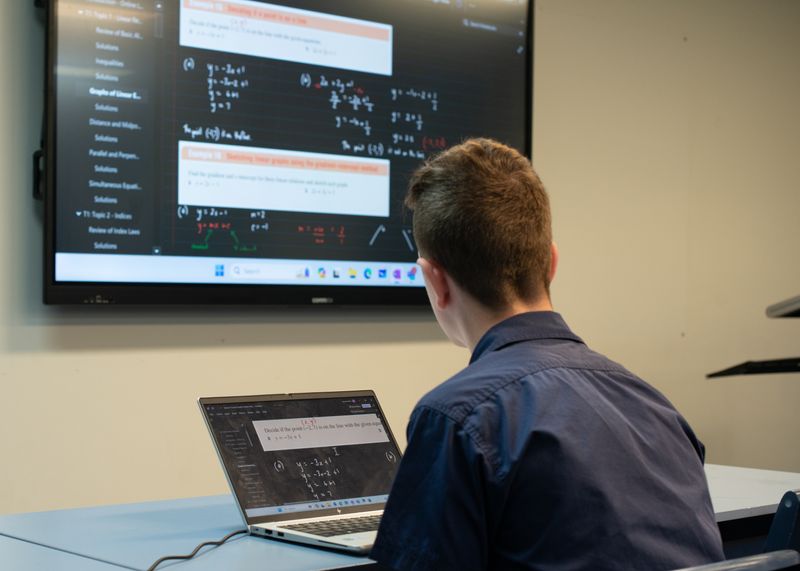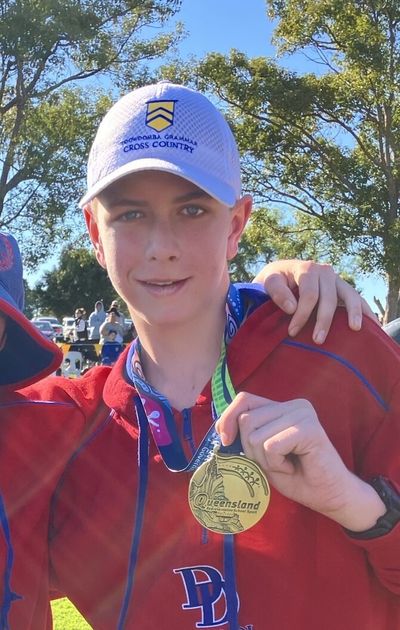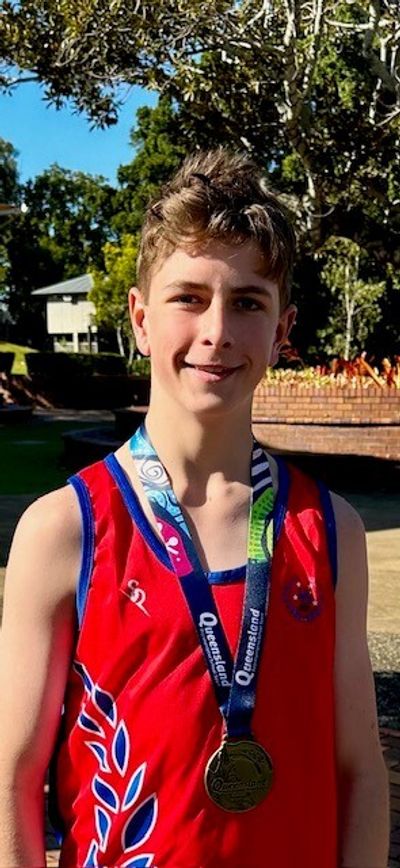“It didn’t really have a big impact on me,” said Mitchell stoically. My parents were much more upset than me; I just rolled with it.”— Mitchell Wilkes

Imagine being told that your world of colour was going to be dark in a few years, that you were slowly going blind.
That was the heart-wrenching diagnosis for Year 10 student, Mitchell Wilkes, right on Christmas in 2021. Mitchell’s mum noticed he wasn’t reading properly and had a gut feeling that there was something wrong with his eyesight. A trip to the optometrist revealed a thinning in the retina, and further tests showed that Mitchell had a genetic condition called Stargardt Disease, a juvenile macular degeneration illness that results in slow central vision loss.
Since then, Mitchell has lost a considerable amount of vision. He had 6/16 when he was first diagnosed and now sits at 6/60. There is a possibility that he could go completely blind by the age of 30, but if he’s lucky, he might retain some peripheral vision. He currently needs to look above a person’s head to see their face. He also adjusts the way he looks at everything to ensure objects are not in his blind spot. However, the details of objects tend to be blurry.
“The School and staff have been really supportive of my learning,” said Mitchell gratefully.
“Mr Ron Robinson and the IT department have put a lot of things into place to make it easier for me, providing me with a more powerful laptop, better access to devices and assistance with exams. I’ve also received great support from the Head of Department for Diverse Learners, Ms Amanda Gibson.”
“I have one classroom that has special equipment where the other students join me. All my classes except science and music are held in this room.”
Mitchell uses the default magnifier on his laptop and has a special iPad that zooms into the whiteboard at the front of the class. His teachers always check in to ensure he’s coping with the material. They also provide extra support when required, ensuring Mitchell has larger resized documents and worksheets. It’s these little things that have made the challenges at school much easier to cope with.

“The biggest challenge for me is mobility; crashing into things and not being able to recognise people until they’re really close to me, that’s really annoying,” said Mitchell.
“But I’ve got great friends here at TGS, and all the boys understand and work around my condition. They’re really good about it.”
Mitchell says his other senses have become heightened to compensate for the loss of his vision. His excellent hearing and exceptional memory are both particularly useful for his co-curricular activities. Mitchell is an avid musician, runner and mountain biker.
“I’m very slow and cautious on new mountain bike trails. I map them out carefully then memorise it so I can ride them normally next time,” said Mitchell confidently.
“My good hearing provides me with an alert system; I can hear other riders braking, which lets me know something is ahead. I love the challenge of mountain biking, going fast and free.”
Mitchell also loves running; he takes every opportunity to experience the sense of freedom it brings him. He trains five to six days a week for the TGS cross country team. He’ll walk the course beforehand, memorising the track to ensure he can confidently run it without tripping. Mitchell has also had huge success in aquathlon events thanks to the help of his guide runner, fellow TGS student, Alby Galbraith.
“I’m so grateful for his support,” said Mitchell.
“There is a 50cm tether between us. We run arm-in-arm, and Alby guides me. We won the multiclass division at both the state championship in Hervey Bay and the nationals in Perth in March,” Mitchell explained.
“It was a huge achievement, and I don’t think I could have done it without Alby.”

Mitchell’s great memory also serves him well in his musical endeavours. He plays the saxophone for the TGS Concert/ Show Band, sings in the Choir and the Grammarphones and also plays piano. The music staff have been extremely supportive of Mitchell’s challenges. They cut the music into very magnified chunks, which he scrolls through with a foot pedal when learning the track. After he has quickly memorised the music, he can play the piece without a score.
“I love to just sit and play music,” said Mitchell.
“I really enjoy it, and it just relaxes me. I’m so appreciative of the support and guidance of all the music staff at TGS.”
With only two years left at the School, Mitchell is already thinking about his future. He would like to be a drone pilot and study podiatry at university. With all his strength and determination, there is no doubt he’ll achieve his goals.
“My blindness is just part of me. I won’t let it stop me,” said the determined young man.
“From what I’ve dealt with, it’s way easier to take any challenges as they come and let them add to you rather than hinder your growth.”
Update:
Continuing with his great running form, Mitchell has won gold at the Queensland Cross Country State Championships in the Under 15 multiclass category at Bald Hills in Brisbane on Saturday, 13 July. It sees him now travel to the National titles at Yarra Glen near Melbourne where he'll compete from 20 to 23 August 2024. We continue to wish him all the very best!


Latest Blog
Fostering Growth and Resilience
This philosophy is vividly demonstrated through our Junior School MATES program, an initiative designed to equip boys from Prep to Year 6 with the skills they need to thrive both in and out of the classroom. Year 6 leader Hugo Seaby epitomises what the program is all about. As a leader in Stephens House, he explains its importance: “It’s about spending time with the younger boys and learning about honesty, respect, kindness and other attributes like that.” He said that it’s helpful for the…
Preparing for the Future of Work
For months I have been watching the earthworks being undertaken ahead of construction for the new DET Centre at Toowoomba Grammar School with interest. It is hard to miss, given that the Headmaster’s residence, our family home, is right next to the building site. The vibrations can be unsettling, and the noises are constant. However, each day reminds me of the important work underway to secure a part of the School’s future. Soon, all boys at TGS will have the opportunity to immerse themselves…
“Watch your character, it becomes your destiny.”
Whether it was American essayist Ralph Waldo Emerson, Chinese philosopher Lao Tzu, or even UK Prime Minister Margaret Thatcher’s father who coined the phrase “watch your character, it becomes your destiny,” it was Dr Linda Evans who gave it real relevance to a theatre full of students, staff and families. After a decade and a half in charge of Toowoomba’s respected Fairholme College as Principal and some 22 years in total on staff, Dr Evans will leave the institution she has led and loved by…
Preparation for Boarding: Practical Tips and Tricks
In fact, I’ve coined the phrase “the clearer the runway, the smoother the landing” as a neat summary of this observation. A great deal of boarding experience can be initiated at home in the weeks and months leading up to your son’s departure, helping him prepare psychologically and logistically for his upcoming journey. At TGS, we acknowledge that the boarding journey for boys and families starts long before they enter the house in late January. In the mind of a new boarder and their family,…
Exploring the Role of Neuroscience in Supporting Teenage Boys
Recent insights from neuroscience reveal that the teenage brain undergoes significant changes, particularly in the frontal lobe, which is essential for decision-making, impulse control and emotional regulation. By leveraging this knowledge, we can create supportive environments that guide our boys through the complexities of their teenage years.The Prefrontal Cortex The prefrontal cortex, located in the frontal lobe, is one of the last areas of the brain to mature, significantly impacting…
Wellbeing and Character Development Program — Benefiting Students and Staff Alike
In 2024, the School re-established the Head of Pastoral Care position. The role will be pivotal in supporting all staff to foster a supportive and nurturing environment at Toowoomba Grammar School. Integral to the role’s success is the parallel expansion of the Wellbeing and Character Development (WCD) program to yield multifaceted benefits for both staff and students. For staff, the Head of Pastoral Care provides guidance, support and resources, aiding in their efforts to address students’…
Nurturing the Seeds of Leadership
Early exposure to leadership roles helps children develop character traits such as responsibility, empathy, resilience and integrity. As a School, we provide the opportunity for the cultivation of leadership skills in our young boys. From the formative years in Prep through to the adolescent years of Year 6, the importance of fostering leadership qualities cannot be overstated. In our modern world, where adaptability, resilience and initiative are regarded as quality attributes, nurturing the…
Pedal Power: The TGS Mountain Bike Club
What started with 12 boys now has 90, with many of the riders racing in the Schools Academy Gravity Enduro Series and other events. We also have a tour of 20 boys going to Thredbo in December this year, where they will tackle some of the most exciting trails in Australia. We thank the wonderful group of parents who support the club. They can often be found driving vehicles up and down the range on a Sunday morning to support the boys. We would not have been as successful as we are without…
Beyond the Blue and Gold
Our focus is to work with each individual student to assist in creating awareness of the world of work, helping students to articulate their interests and identifying what is important to them and their values. We assist the boys in developing the skills to explore the different careers out there. We connect them with employers and industry professionals and help them navigate towards the job or career they are interested in. We work hard to individualise each student’s unique School journey to…